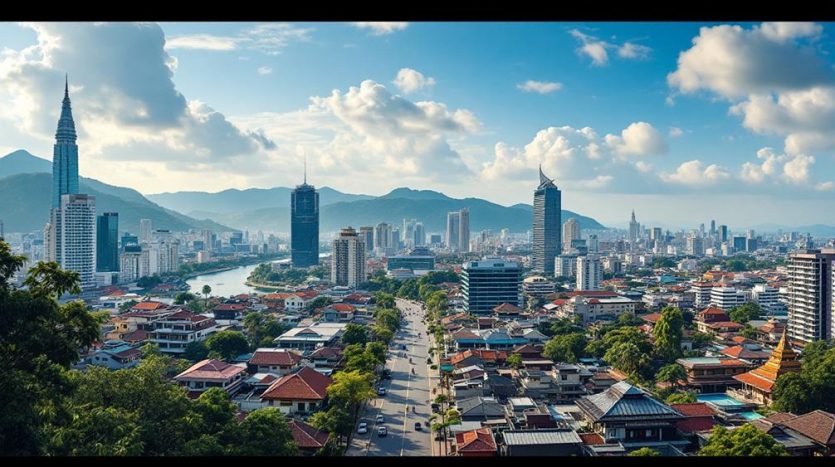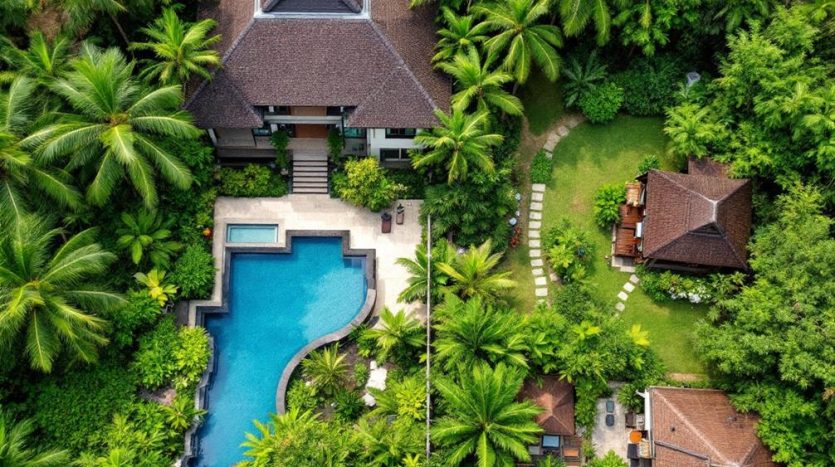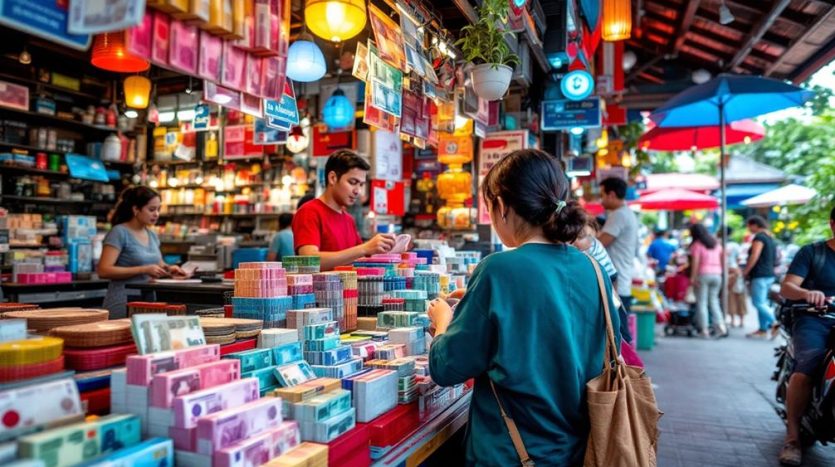Is Property Cheap in Thailand?
You're probably wondering if property in Thailand is truly a bargain. The answer isn't as straightforward as it seems. Prices vary widely, with rural areas offering some surprisingly affordable options, while urban centers like Bangkok and Chiang Mai tell a different story. The allure of coastal properties adds another layer of complexity, often pushing prices higher. Foreign investment and currency exchange rates further influence the market, presenting both opportunities and challenges. So, what's the real deal for budget-conscious buyers or those eyeing a luxury escape? There's more to discover about traversing this intriguing market.
Key Takeaways
- Urban properties in Thailand, like Bangkok, are expensive, with high demand and infrastructure contributing to rising prices.
- Coastal areas see higher property prices due to increased demand from expats and retirees.
- Rural properties in Thailand are more affordable, often costing half or a third of urban equivalents.
- Budget properties in smaller cities and outskirts can be found for under $1,000 per square meter.
- Foreign investment inflates property prices, especially in popular urban centers like Bangkok, Pattaya, and Phuket.
Factors Influencing Property Prices
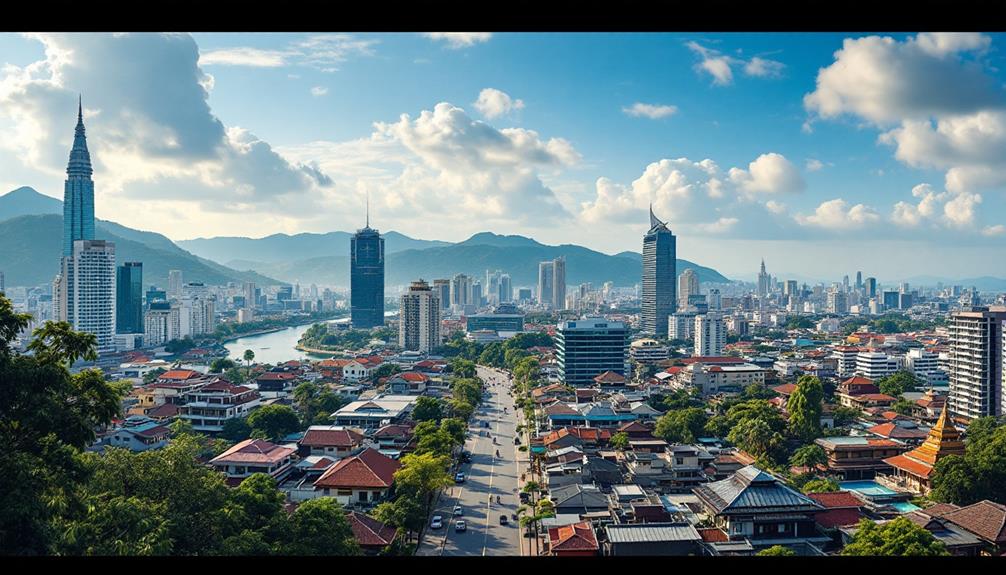
When examining property prices in Thailand, several key factors come into play.
First off, you're going to want to keep an eagle eye on economic indicators. These nifty little numbers, like GDP growth and inflation rates, can tell you more about the property market than a fortune teller with a crystal ball. A robust GDP suggests a healthy economy, which usually means rising property prices—good news if you're selling, not so much if you're buying on a budget.
Then there's market demand, which can fluctuate like your mood before your morning coffee. If demand for property is soaring, expect prices to follow suit, much like a kite on a windy day. Thailand's been seeing an influx of expats and retirees, drawn to its beaches and spicy tom yum, pushing demand up faster than a tuk-tuk in Bangkok traffic.
Importantly, rental markets in regions like Chiang Mai offer a more affordable option compared to bustling Bangkok.
Finally, government policies and interest rates can sneakily influence prices. Lower interest rates make mortgages more palatable, boosting market demand.
Comparing Urban and Rural Areas
When comparing urban and rural areas in Thailand, you'll notice that urban property prices have been trending upwards, driven by demand in key cities like Bangkok and Chiang Mai.
Properties in these urban areas often reflect a high cost per square meter due to their proximity to amenities such as schools and hospitals, making them appealing yet expensive choices.
In contrast, rural areas often offer more affordable options, influenced by lower land costs and less competitive markets.
Analyzing these differences can help you understand where the best opportunities lie based on your investment goals.
Urban Property Price Trends
Recent data reveals a significant divergence in property prices between urban and rural areas in Thailand. If you've got your eye on city life, brace yourself: urban property valuation is on a meteoric rise faster than you can say "Pad Thai."
In bustling cities like Bangkok, market forecasts predict prices will continue their upward trajectory. It's like urban properties have joined a marathon and they're not looking back.
Why the spike, you ask? Well, urban areas are the life of the party, attracting businesses, tourists, and, yes, traffic jams. This cocktail of opportunities and congestion has created a demand that even the most skeptical property pundit can't deny.
The urban market is hotter than a Thai chili, driven by infrastructure projects and a growing expat community.
Now, let's not forget the humor in this housing hustle. Urban prices make your wallet feel like it's been on a strict diet—thin and light.
But hey, when you're paying for a front-row seat to city lights and skyscrapers, you're not just buying property; you're buying bragging rights.
Rural Affordability Factors
While urban property prices soar, rural areas in Thailand present a contrasting picture, characterized by affordability and slower growth. You might think of rural Thailand as that lovable underdog in the property market—steady, reliable, and not trying too hard to impress.
Rural development is gradually picking up pace but at a chill, laid-back pace that'd make even the most stressed-out city dweller jealous.
The secret sauce to this affordability? It's all about land availability. Unlike urban areas where every square meter is fought over like the last donut in the office breakroom, rural regions boast expansive plots of land just waiting for someone to claim them. Prices here remain surprisingly reasonable, often half or even a third of what you'd find in the bustling cities.
Of course, rural development isn't just about cheap land. Infrastructure improvements, like better roads and internet connectivity, are slowly making rural areas more appealing, yet they haven't driven prices sky-high—at least not yet.
Luxury vs. Budget Properties
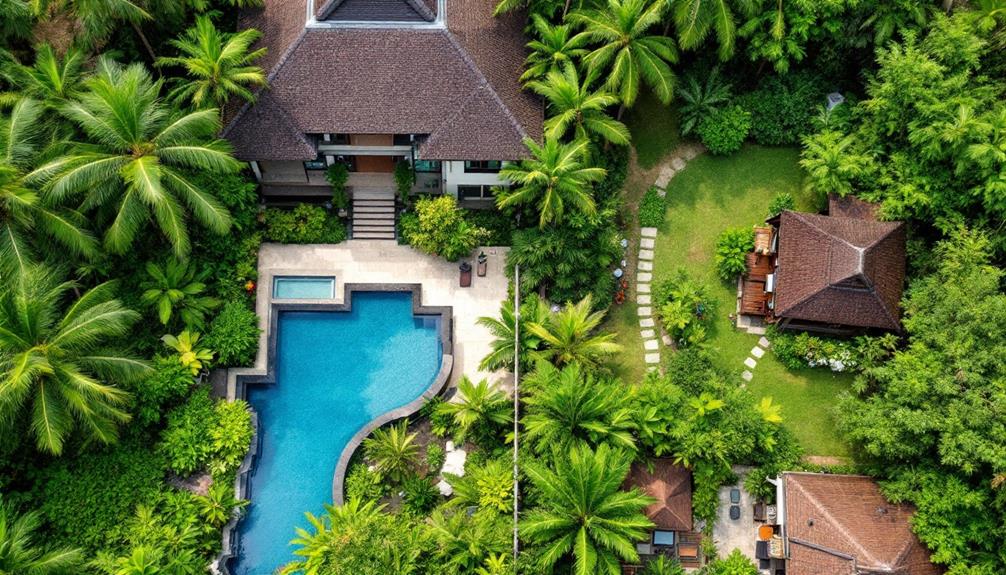
Thailand's real estate market offers a diverse range of options, from opulent luxury properties to more budget-friendly alternatives. If you're chasing luxury, properties in Bangkok's upscale neighborhoods might catch your eye. With prices per square meter soaring up to $4,000, you'll not only be paying for a prime location but for those luxury amenities too.
We're talking infinity pools, concierge services, and gyms that make your local one look like a medieval torture chamber. You know, the kind of place where even the towels have towels.
On the flip side, if you're maneuvering budget constraints, Thailand still has plenty to offer. Head to smaller cities or the outskirts of Bangkok, and you might find properties dipping below $1,000 per square meter.
Sure, you might miss out on the rooftop helipad, but who needs that when you've got a perfectly good bus pass, right? For those looking for a blend of affordability and convenience, public transportation like the BTS and MRT in urban areas can keep commuting costs low, making these budget-friendly locales even more appealing.
Analyzing the data, the stark difference between luxury and budget properties in Thailand is evident. Yet, both ends of the spectrum offer value—whether it's sipping cocktails on a sky-high balcony or enjoying pad thai in a cozy neighborhood joint.
The choice is yours, just mind your wallet!
The Impact of Foreign Investment
You'll notice that foreign investment markedly influences rising property prices in Thailand, as data shows a steady increase over the past decade.
Government investment regulations, designed to control this influx, play an essential role in shaping the market.
Foreigners often engage in condominium investments, which are popular in urban areas like Bangkok, Pattaya, and Phuket.
Understanding local market dynamics is vital to gauge whether these investments create sustainable growth or merely inflate real estate costs.
Rising Property Prices
Foreign investment has greatly influenced the rising property prices in Thailand. You might think you're getting a sweet deal on a beachfront condo, but in reality, you're dancing the cha-cha with property speculation.
Foreign investors have an uncanny ability to make the Thai property market resemble a game of Monopoly, where everyone wants Boardwalk, and nobody's interested in Baltic Avenue. With Bangkok's skyline looking more crowded than a tuk-tuk in rush hour, there's no denying market saturation is setting in.
Now, don't let that scare you away. It's not like the property market's about to pop like an overinflated balloon animal at a kid's party—at least, not yet. Data from Knight Frank suggests that foreign ownership has increased by nearly 20% over the last five years, driving prices skyward faster than a tourist on a spicy Thai curry.
But here's the kicker: as foreigners snatch up property, locals find themselves in a pickle, trying to keep up with these soaring prices.
Government Investment Regulations
Many factors come into play when examining Thailand's government investment regulations, particularly concerning foreign investment. If you're eyeing that dreamy Thai property, here's what you need to know before diving in with your checkbook:
1. Government Incentives and Investment Restrictions: Thailand dangles government incentives like a carrot on a stick for foreign investors. However, don't go all in just yet; investment restrictions are the fine print you can't ignore.
Foreign ownership of land is typically capped, so you might find yourself in a long-term lease rather than outright ownership.
2. Taxation Policies: Taxation policies can be as confusing as a Thai street market, but they play a pivotal role. The government's taxation approach may seem like a burden, but they aim for a fair balance, ensuring you pay your dues without breaking the bank.
3. Development Permits and Infrastructure Projects: Development permits and infrastructure projects are the backbone of Thailand's real estate growth.
The government encourages infrastructure projects to boost property value, but getting development permits might feel like solving a Rubik's Cube blindfolded.
Local Market Dynamics
The influx of foreign capital shakes up Thailand's local real estate market, creating a dynamic environment ripe for both opportunities and challenges. You might be wondering how this affects local buyer preferences.
Well, picture a Thai buyer eyeing a cozy condo, only to find it caught in a bidding war reminiscent of a high-stakes poker game, thanks to international investors. The market competition intensifies as foreign investors, armed with deep pockets, swoop in like seagulls on a dropped sandwich at the beach.
Data shows that in 2023, 25% of property transactions involved foreign buyers, up from 15% in 2018. This influx leads to higher property prices, which can be both a boon and a headache. On one hand, local sellers might feel like they've hit the jackpot. On the other, local buyers might feel like they're trying to buy a unicorn with a handful of beans.
To navigate this tricky landscape, you need to understand the market's ebb and flow. Keep an eye on trends and adjust your strategy accordingly.
After all, in this competitive market, even a savvy buyer could end up feeling like they're playing Monopoly—without passing Go or collecting $200.
Currency Exchange Considerations
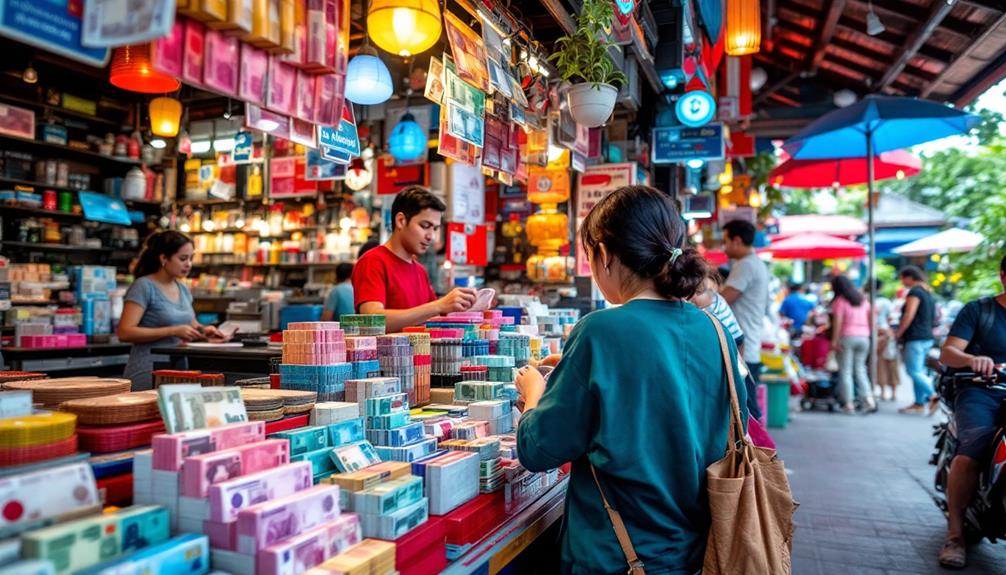
Steering through the complexities of currency exchange is essential when considering property investments in Thailand. You might think you're just buying a cozy beach bungalow, but currency fluctuations can turn your dream home into a financial nightmare faster than you can say "exchange rates."
Here's why you need to keep your eyes peeled:
- Currency Fluctuations: The Thai baht isn't shy about taking a roller-coaster ride. A sudden dip or rise can change the price of your property overnight. Imagine buying that charming villa, only to find out it's now 10% more expensive because of an unexpected baht surge. Ouch!
- Exchange Rates: Let's face it, exchange rates are like your internet connection—unpredictable and can cut off your plans without warning. A favorable rate today might vanish quicker than free snacks at a board meeting tomorrow.
- Market Trends: Stay alert to global economic conditions. A strong dollar might make Thai property seem cheap, but if the baht strengthens, it's like finding out your "fantastic deal" was actually a prank.
Legal Aspects of Buying Property
When considering property investment in Thailand, it's important to understand the legal landscape to avoid potential pitfalls.
Let's face it, you don't want your dream beach house to become a legal nightmare. The Thai legal system offers a unique twist on property ownership—think of it like a plot twist in a mystery novel, except less fun if you're unprepared. Foreigners can't own land directly, but you can own a condo, provided that no more than 49% of the building is foreign-owned. It's as if balancing a legal seesaw!
Navigating legal documentation is vital. You'll need a Chanote title deed to guarantee secure ownership, not just a napkin with your name scribbled on it.
Also, consider the 30-year lease option to "own" land—renewable but not guaranteed, much like your subscription to that streaming service you keep forgetting to cancel.
Hiring a lawyer to review your documents isn't just advisable; it's like wearing a helmet while cycling—smart and potentially life-saving.
Tips for Prospective Buyers

Thinking about buying property in Thailand? Fantastic choice! But before you plunge into it, let's arm you with some market-savvy tips. It's not just about finding that picture-perfect beachfront villa; it's also about playing it smart.
- Master negotiation strategies: In Thailand, the art of haggling isn't just for street markets. Be prepared to negotiate like you're on your favorite reality TV show. Research property values and make offers that reflect current market trends. Sellers often expect some back-and-forth, so channel your inner dealmaker.
- Explore financing options: Unless you've got a treasure chest hidden somewhere, you'll need to evaluate how to finance your new slice of paradise. While Thai banks may offer loans to foreigners, terms can be tricky. Think about international banks or even seller financing options to get more flexible terms.
- Understand market dynamics: The Thai property market's as unpredictable as a cat on catnip. Prices can vary greatly based on location, property type, and economic factors. Keep an eye on market reports and trends to make informed decisions; after all, you wouldn't want to invest in a property that's as overpriced as an airport sandwich!

